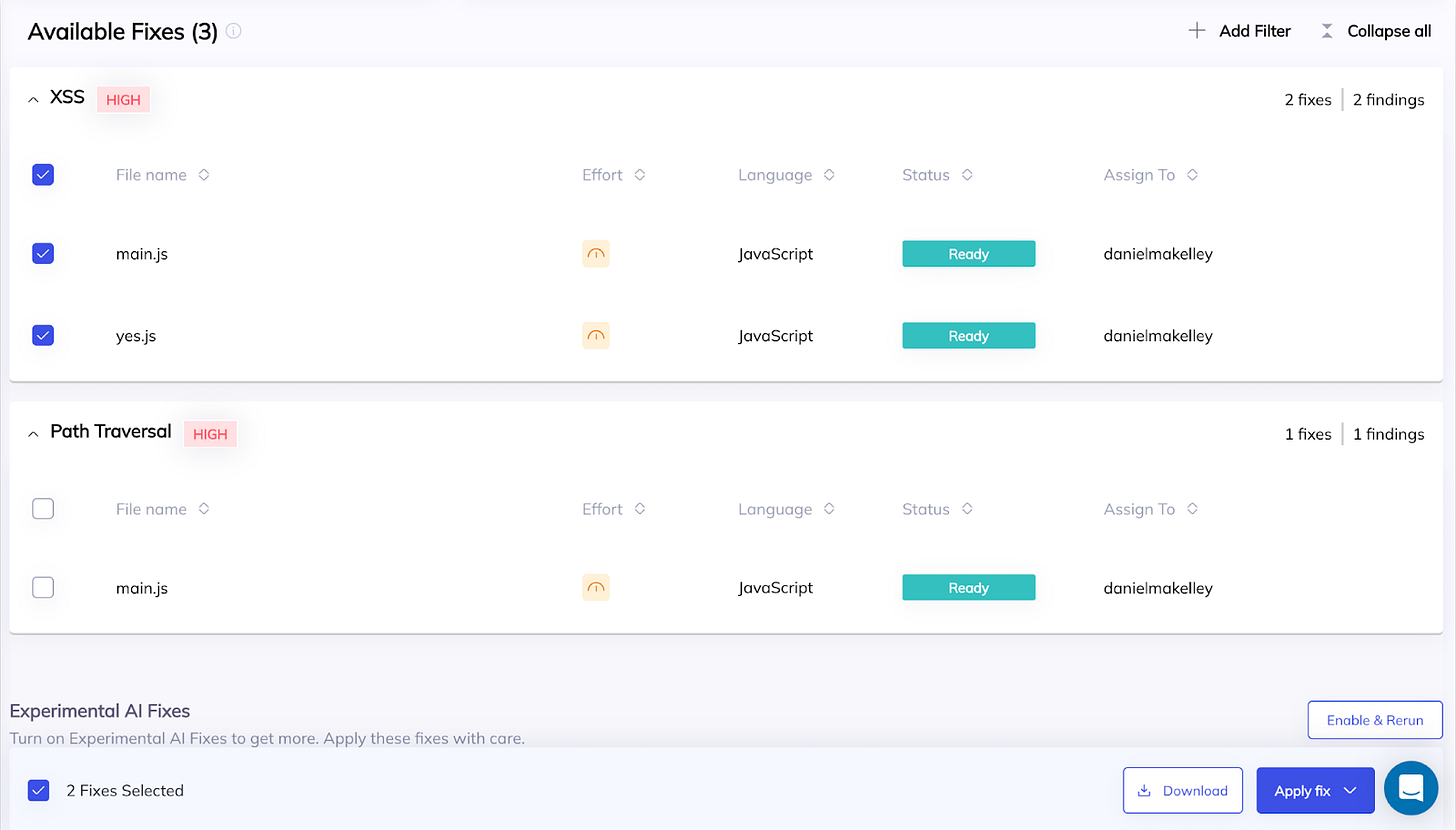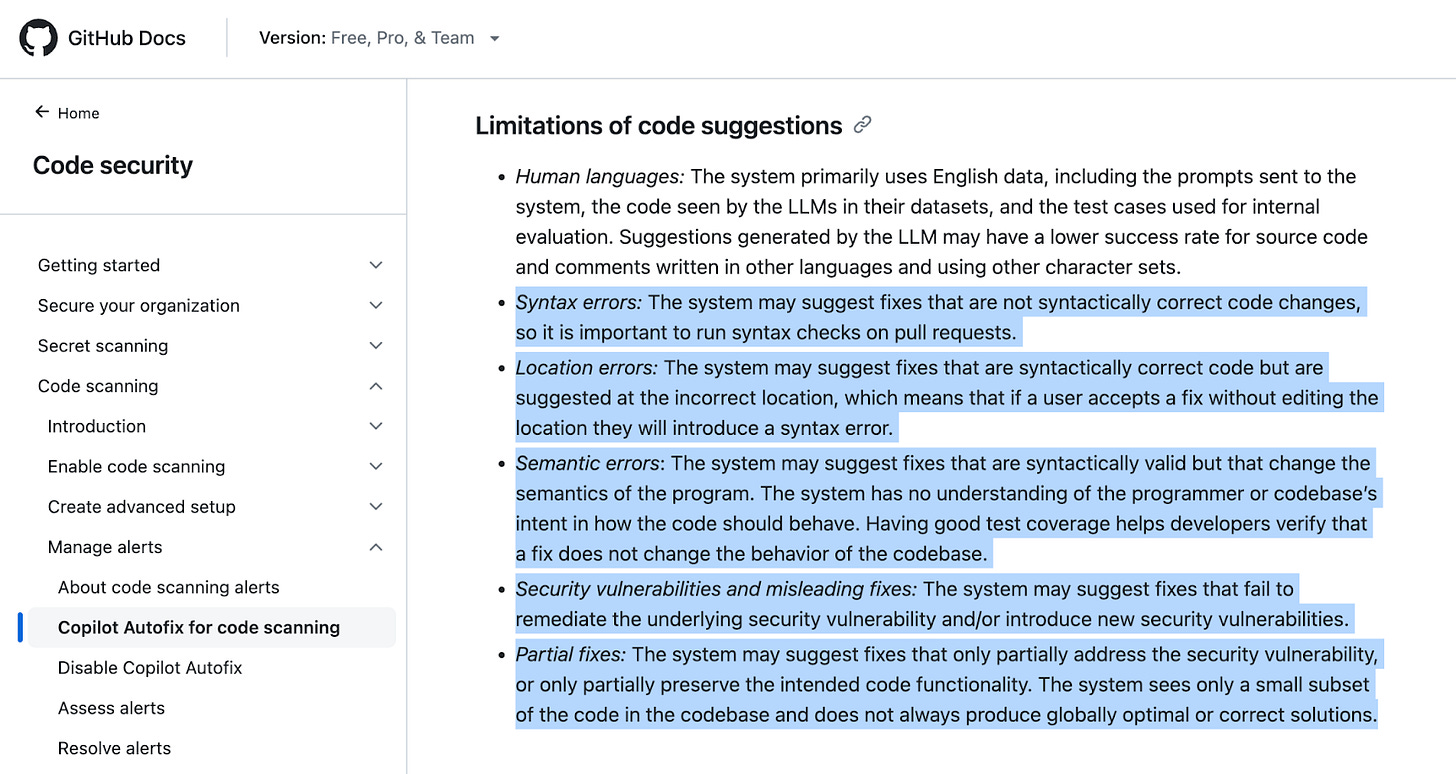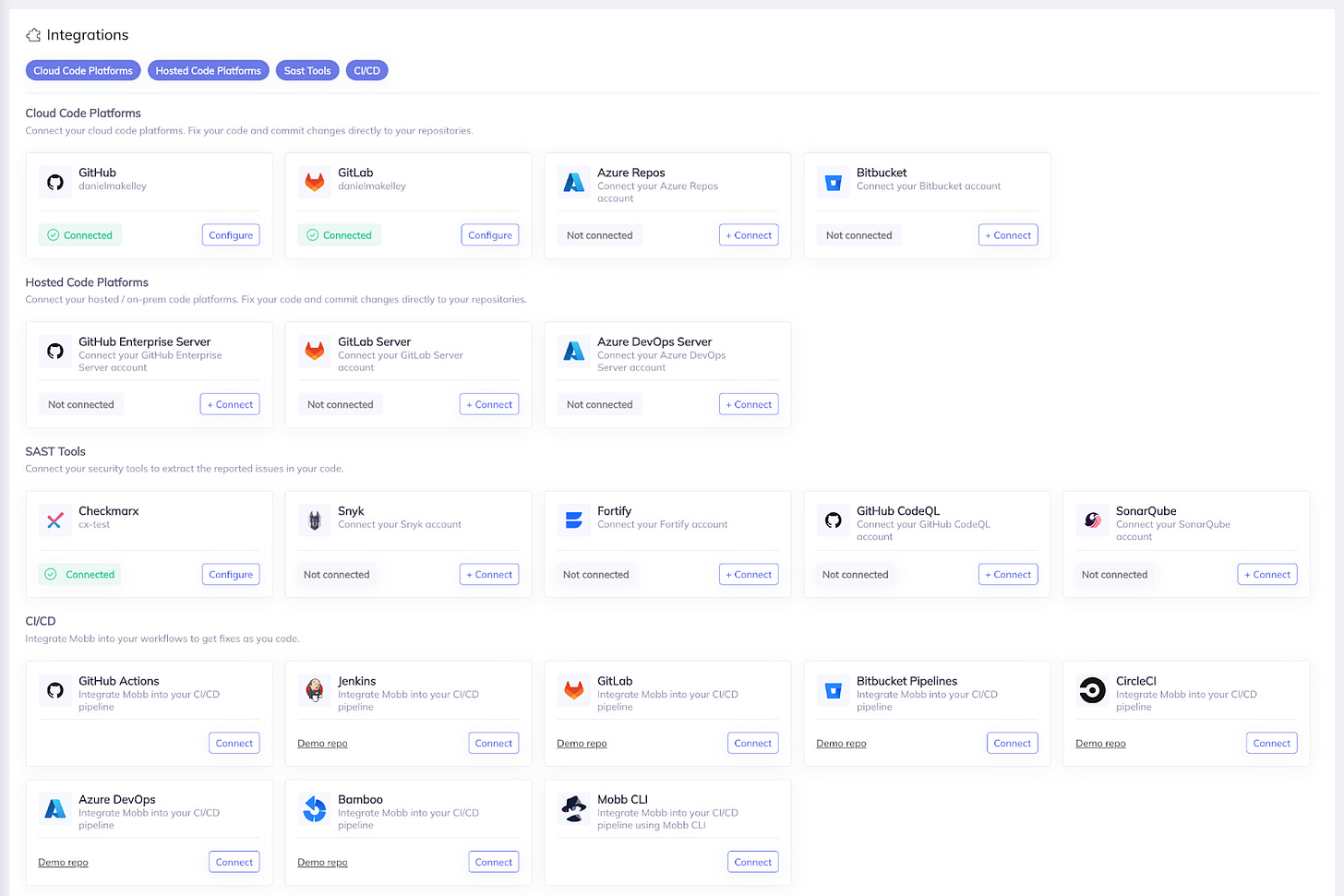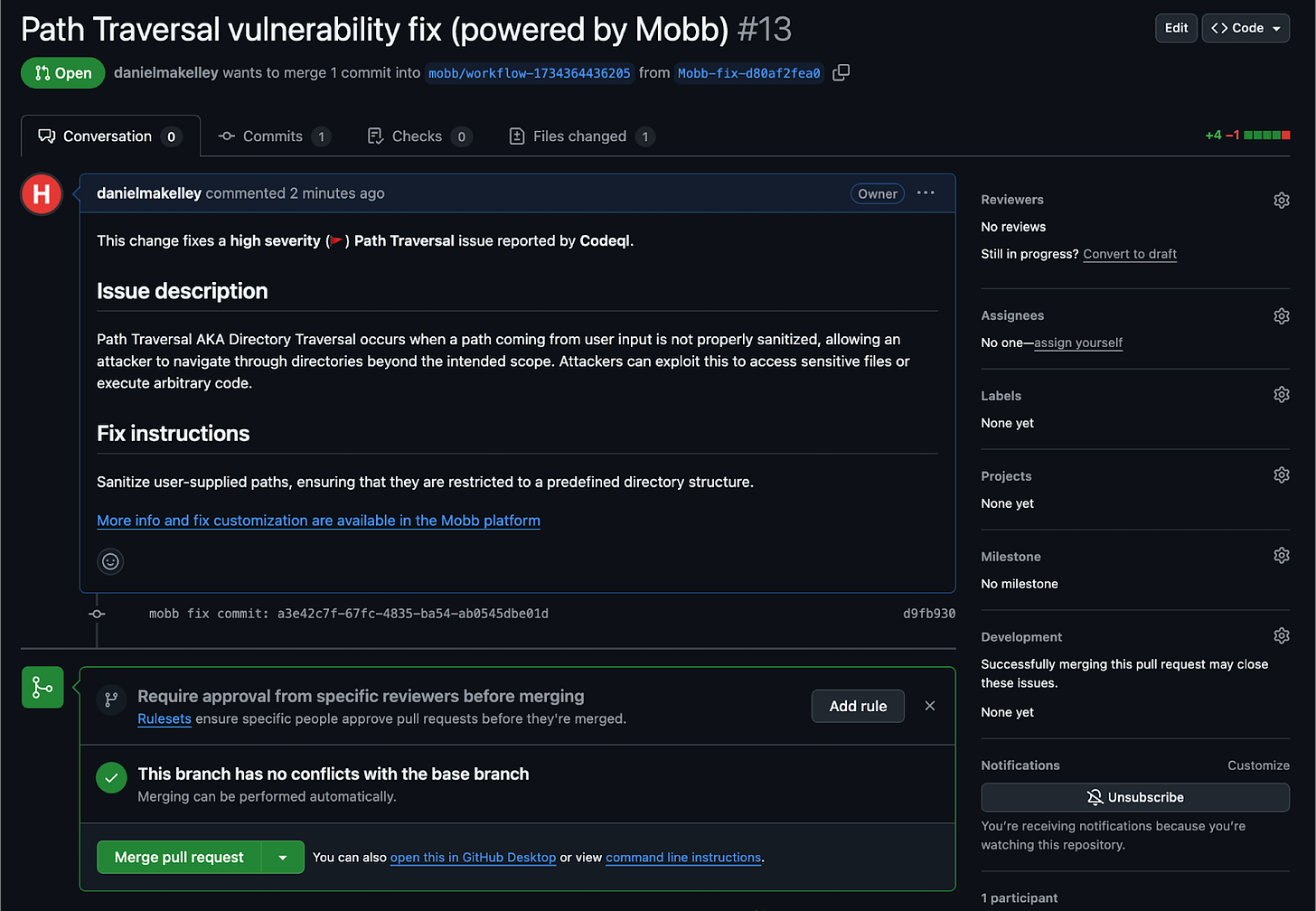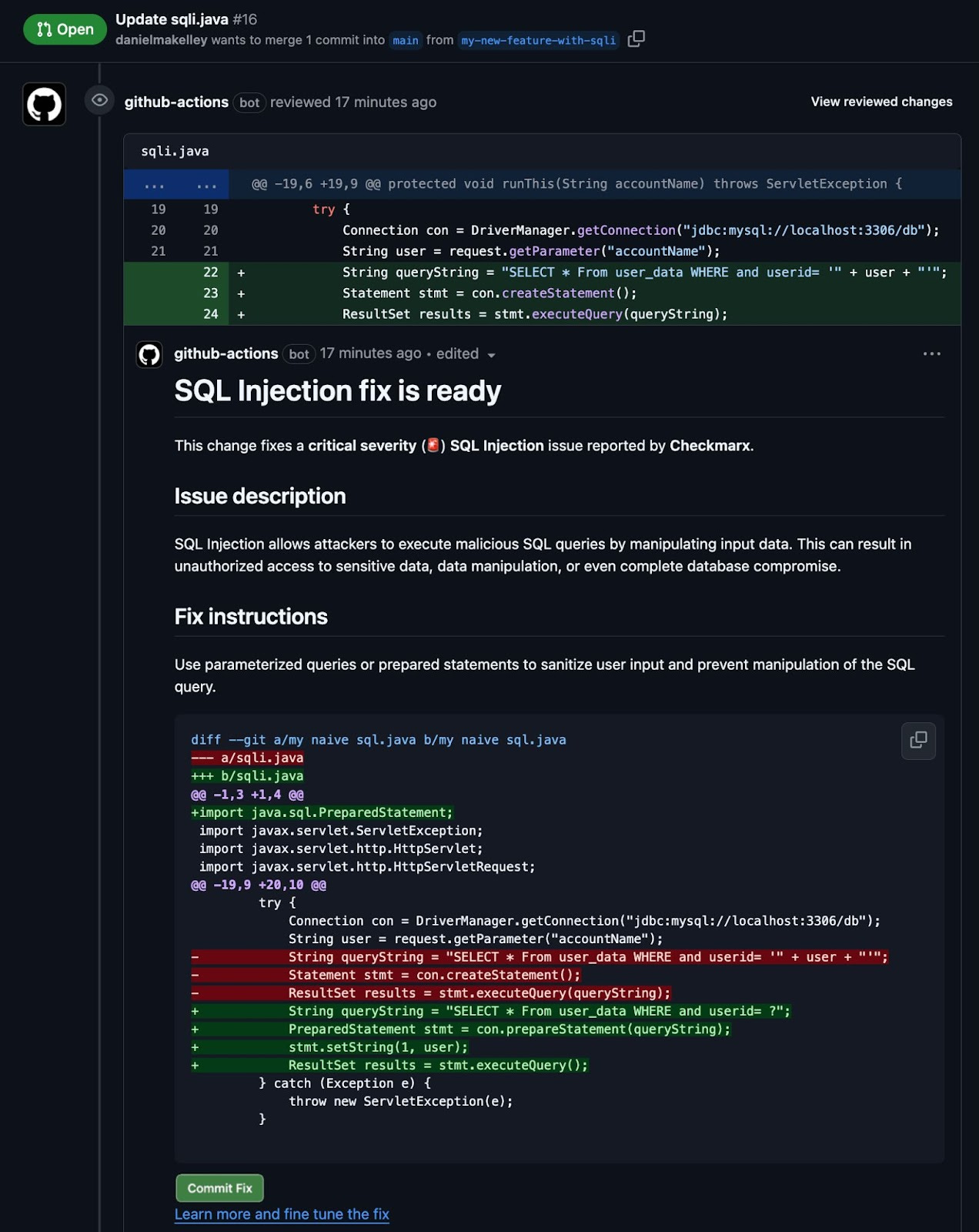5 Key Factors to Consider When Purchasing an Automated Code Remediation Tool
Discover how automated code remediation tools can streamline your development process and improve security.
The introduction of AI-powered tools in cybersecurity has helped with vulnerability detection, allowing organizations to identify issues faster than ever. However, efficiently remediating these vulnerabilities still remains a challenge for many teams.
Popular tools like Checkmarx AI Security Champion, GitHub Copilot Autofix, Snyk Codes AI Fix, and Veracode Fix offer powerful detection capabilities and remediation support. Yet, many organizations find themselves limited by the constraints of traditional remediation workflows, such as one-issue-at-a-time fixes or platform-specific solutions.
Mobb takes a different approach, focusing exclusively on scalable, consistent, and deterministic remediation. With tool-agnostic integrations and a developer-first mindset, Mobb optimises the remediation process, allowing teams to secure their codebases faster and more efficiently.
1. Bulk Fixes for Backlog Management
The primary advantage of Mobb is its scalability and efficiency in backlog management. Mobb allows teams to programmatically apply a validated, deterministic fix across thousands of instances simultaneously, greatly accelerating the remediation process.
For instance, a development team managing a large legacy system with numerous SQL injection vulnerabilities usually spends a substantial amount of time reviewing and fixing each issue individually. With Mobb, they can validate and deploy a single fix across all similar issues in the system.
Image: Mobb - An example of the ability to apply mass fixes with a button
This capability stands out when compared to Snyk DeepCode AI and other tools, which require developers to apply fixes one at a time. Such methods are often ineffective for managing large backlogs and can lead to large bottlenecks.
Image: Snyk DeepCode AI - Developers have to generate and apply fixes one-by-one
By enabling a single fix to be applied across multiple instances, Mobb not only speeds up the remediation process but also removes the bottlenecks associated with sequential fix applications. This efficiency allows development teams to fix vulnerabilities more quickly, thereby improving both security and productivity.
2. Deterministic Fix Consistency
Secondly, fixing vulnerabilities isn’t just about speed—it’s also about ensuring that the changes made to the codebase are consistent and reliable. Mobb employs deterministic algorithms that guarantee each fix follows the same logic and standards, eliminating the variability often seen in AI-generated solutions.
Image: GitHub Copilot Autofix - Limitations you should understand
Unlike tools that offer context-specific fixes that may vary or require additional QA validation, Mobb provides predictable and repeatable results.
This consistency minimizes the risk of introducing new bugs during the remediation process and ensures smoother QA cycles.
Development teams can confidently apply fixes across their codebase, knowing that each change will adhere to the same high standards.
3. Compatibility With Tools
In terms of integration, Mobb integrates quite easily with a wide range of tools, making it a good choice for diverse development environments. Unlike some tools, which may be confined to specific ecosystems, Mobb supports integrations with popular static application security testing (SAST) tools and CI/CD pipelines.
Image: Some of the integrations and tools that Mobb supports
This flexibility ensures that organizations can use Mobb alongside their existing tools to optimize remediation efforts.
For instance, a team using GitHub CodeQL for vulnerability detection can rely on Mobb to apply fixes directly within pull requests or via its CLI, creating a unified remediation workflow.
4. Developer-Centric Guidance
Mobb is designed with developers in mind, offering detailed guidance to ensure that fixes are actionable and practical.
While tools like Checkmarx or GitHub Copilot provide general suggestions, Mobb’s focus on developer empowerment allows teams to customize fixes to suit their workflows.
Image: An example of a pull request by Mobb with developer guidance
This ensures that remediation efforts are not only effective but also integrated into day-to-day development processes.
5. Natural Dev Workflow Integration
For remediation to be effective and scalable, it must easily integrate into the tools and processes developers already rely on. Mobb is designed to fit naturally into existing workflows, enabling developers to address vulnerabilities without disruption.
It integrates directly with platforms like GitHub, GitLab, and Bitbucket, delivering fixes as pull requests so developers can review, test, and merge changes within their usual code review workflows—no extra tools or processes needed.
Image: A fix suggestion added by Mobb immediately when introducing a new issue in a pull request
Mobb also works with CI/CD tools like GitHub Actions, CircleCI, and Jenkins, automating remediation during build and deployment cycles. This ensures vulnerabilities are fixed in real-time without slowing delivery pipelines.
Whether your team uses Mobb via its CLI, embeds it in CI workflows, or integrates it into DevOps pipelines, Mobb offers flexible deployment options to suit your setup.
Adopt The Future of Automated Code Remediation
The focus on detection in the security industry has caused organisations to become overwhelmed by the backlog of vulnerabilities that still need to be fixed.
Platforms such as GitHub Copilot, Snyk Codes AI Fix, and Checkmarx are excellent at finding problems, but they are honestly either inconsistent, ineffective, or not feasible to use on a larger scale.
Mobb transforms the game by demonstrating that automated code remediation is essential, not just a possibility. Try Mobb today and see how it transforms your approach to code remediation.



